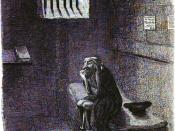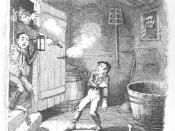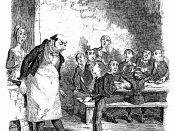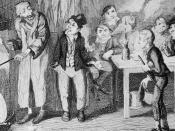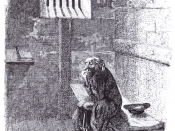Essay"Those considered, vilest of mankind often have an agreeable persona, while those considered, the saviours of mankind often lack the persona in question" (Pierre Trudeau). This quotation signifies that a person that appears to be composed of a despicable nature often has a bit of good within him while a person with an assumed moral nature may lack the certain goodness that the despicable personage harbours. The above quotation often applies to society because people appear to be very noble and appear to be very sinful. When people are put in a circumstance where ones true intentions become known, a supposed evil personage will often demonstrate some good quality that isolates him from a total evil persona and vice-versa. For example, a person of supposed evil often takes care of their family members. They may commit many acts of injustice upon others but they refrain from doing so towards their family and strive to fulfill their needs, resources permitting.
In the book Oliver Twist, Christian people, who are people generally associated with good qualities; fail to demonstrate the quality of care, which non-Christian personages, generally considered evil, demonstrate. Christian people are considered virtuous people nevertheless in Oliver Twist; they practice unchristian behaviour, while criminals such as Fagin demonstrate unchristian behaviour and Christian behaviour when it comes to caring for a fellow being. These criminals offer resources for personal use and impart great affection upon Oliver, a characteristic normally attributed to Christian people. Oliver is visibly moved by the kindness received from the criminals; a kindness that was unprecedented in his childhood. The care bestowed upon Oliver Twist by Fagin, rivals and surpasses the care received by people who proclaim and taint the name "Christian" despite the fact that Fagin exemplifies murderous dispositions.
The word 'Christian' reverberates with qualities of sympathy for another's plight and provides a visage under which these 'Christians' behave in a non-Christian manner. The vision of a traditional Christian is depicted as a person whose demeanour, personality and ability to sympathize, meets a level in which this person is able to wrought positive changes in those around them. However, in the book Oliver Twist, people who claim to be Christian, behave in a non-Christian manner, that negatively affects the protagonist, Oliver Twist. The non-Christian behaviour demonstrated by Christians is shown through Oliver's simple request for food, "Please sir, I want some more" (Dickens, 17). On a literal level, it appears as if Oliver is asking for more food, also emphasized by his action of putting his bowl forth to receive more food. However in his request the word 'food' is not mentioned thus the inference, Oliver is not only asking for more food but is asking for "â¦some moreâ¦" pleasures in his life of suffering, becomes true. He wants the hardships imposed on his life by Christians to disappear in order to receive "â¦some moreâ¦" pleasures. The reaction to this simple request for "â¦some moreâ¦" pleasantries in his life, demonstrates unchristian behaviour. He is beaten, locked in a cellar and starved to an inconceivable extent. They nearly sold him to a chimneysweep under whom many boys have died. This contradicts the ideal view of a Christian. An ideal Christian would have incurred a positive reaction in which Oliver would have been presented with more food and care, not subjection to inhumane punishments. The unchristian behaviour persists when Oliver is sold off to a coffin-maker. " 'Here, Charlotte,' said Mrs. Sowerberry, who had followed Oliver down, 'Give this boy some of the cold bits that were put by for Trip' " (Dickens, 37). Trip is a dog belonging to the broad classification, animals. Animals are considered lower in status than a human is. When Oliver is given "â¦some of the cold bits that were put by for Trip", it appears that the family he lives in considers him inferior to animals. Had Trip returned to eat his food at the exact time Oliver was prepares to eat Trip's food, it can be assumed that the Christians of the house would have demonstrated an unchristian behaviour in allowing the dog to satiate its hunger first, thus proving that Oliver is regarded as a lower than an animal in society. The extent to which the unchristian behaviour is nauseating is shown through the quotation,"I wish some well-fed philosopher, whose meat and drink turn to gall within him; whose blood is ice, whose heart is iron; could have seen Oliver Twist clutching at the dainty viands that the dog had neglected. I wish he could have witnessed the horrible avidity with which Oliver tore the bits asunder with all ferocity of famineâ¦" (Dickens, 67).
Firstly the author is describing a philosopher "â¦whose meat and drink turn to gall within himâ¦" meaning his meat and drink turn to bile within him, "â¦whose blood is iceâ¦" meaning of cold-blooded (murderous) nature and "â¦whose heart ironâ¦" meaning the philosopher is unable to express emotions that would traditionally confirm one's nature to be that of a Christian. This philosopher may or may not be Christian but his intentions are undeniably of unchristian nature. If he "â¦could have witnessed the horrible avidity with which Oliver tore the bits asunder with all ferocity of famineâ¦" even his "â¦heart (of) ironâ¦" would melt into sympathy at the "â¦ferocity of famineâ¦" in other words the hunger that motivated the boy's action of tearing "â¦the bits asunderâ¦" The "â¦blood (that) is iceâ¦" would return to a warmer state thus turning the philosopher into a warm-blooded person from a cold-blooded (murderous, vile and treacherous) person. The warm-bloodedness of the philosopher would permit sympathy and disgust at the horror, among many Christian emotions, at the unchristian behaviour imposed upon this boy, permeate his heart. The effect of the unchristian behaviour demonstrated by Mrs. Sowerberry as mentioned previously, is enough to invoke a Christian emotion, for instance sympathy within the most hardened of people. "Christian" is merely a title that people keep to maintain an identity in society. The title, "Christian" mars, the unchristian behaviour performed by the above individuals and generally not displayed to society. Envisioning a true Christian in Oliver Twist's childhood is difficult unless unchristian characteristics are attributed to these individuals.
As a non-Christian, Fagin and his collaborators, demonstrate the Christian quality, care, by caring for Oliver Twist, incurring a positive output of emotions from his charge. Fagin's bestowal of excessive care for one of his character is represented by the sympathy for Fagin and his accomplices, incurred within Oliver, despite being inducted into Fagin's criminal workings. This emotion occurs within Oliver despite the fact that he abhors crime and Fagin, whom he directs his positive emotions at, commits what he abhors. The care bestowed upon Oliver surpasses the care received by Christian people such as Mrs. Sowerberry, which is unusual because neither Fagin, nor any of his comrades are Christian, but he demonstrates some aspects of typical Christian behaviour that is not demonstrated by other Christians. Fagin's uncharacteristic affection towards Oliver, for one of his temperament, is shown through Oliver's emotions for Fagin, " 'Oh! God forgive this wretched man!' cried the boy with a burst of tears" (Dickens, 534). The above quotation signifies Oliver's feelings for Fagin around the time of Fagin's hanging for his multitude of crimes committed during his lifetime. Oliver wants "â¦God (to) forgive this wretched manâ¦" showing that he is a Christian because of his plea to a religious entity, God. As mentioned before an ideal Christian demonstrates virtue in every deed they undertake and Oliver demonstrating virtue in multiple ways, is an ideal Christian. Christians are also known for their sympathy given to fellow beings, thus Oliver's plea to God not only proves he's Christian but also encompasses the sympathy level associated with the character of a Christian. In addition, while under Fagin's care, Oliver experiences kindness that he never has before. Despite Fagin's criminality, Oliver is able to perceive and gratefully accept the affection Fagin bestows upon him as one of his own. Hence, when Fagin is to be hanged for his offences, Oliver is still thankful for the care that he received from him and lacked from the Christians involved in his childhood and thus he pleads to God for Fagin to be forgiven for his crimes. Oliver also feels sympathy for Fagin's accomplices because they too bestow a kindness upon him that equals Fagin's and as criminals they symbolize Fagin for him. "For one brief moment, Oliver cast a hurried glance along the empty street, and a cry for help hung upon his lips. But the girl's voice was in his ear, beseeching him in such tones of agony to remember her, that he had not the heart to utter it" (Dickens, 196). An accomplice of Fagin's, Nancy, a non-Christian, to help another of Fagin's accomplices, Bill Sikes, takes Oliver away to rob a house. Nancy has shown kindness towards Oliver, an emotion Oliver readily accepted. The "â¦cry for help hung upon his lipsâ¦" but he remembers the kindness that Nancy has shown him and "⦠the girl's voice was in his ear, beseeching him in such tones of agony to remember herâ¦" meaning the girl asks him to remain silent lest she should get in trouble and to remember all that she has done for him. In addition, Nancy is a criminal, an occupation akin to that of Fagin's. Therefore, Oliver may view Nancy as Fagin, and take every instance of kindness shown by her, as another opportunity to feel grateful toward Fagin. He sees Nancy as Fagin because he is acquainted with him longer. Regardless of whom he envisions when he sees Nancy, one thing remains the same: Oliver's positive reactions are directed at criminals. Nancy and Fagin are not Christians yet they display affection towards Oliver while he is under their care and while they openly practice unchristian behaviour. Yet, people who are supposed 'Christians', practice unchristian behaviour at a lesser magnitude than that of Fagin's, but with respect to caring for other human beings, they become plainly non-Christian. The care received by Oliver from Fagin and his accomplices, all who are non-Christians, is gratefully accepted by Oliver and exceeds the care received from people who are "Christians" in society and unchristian in manner towards Oliver.
Fagin, a criminal imposes care upon Oliver, which the Christians from Oliver's childhood neglect to do. Oliver receives care from Fagin that oppresses the level of care, received in his childhood. Fagin is a non-Christian and a criminal, yet he demonstrates this Christian quality of care while Christians, such as Mrs. Sowerberry, in the aspect of care they demonstrate boorish behaviour usually not attributed to people of their status. Fagin says to Oliver "Stay. There's a pitcher of water in the corner by the door. Bring it here; and I'll give you a basin to wash in, my dear"(Dickens, 80). The above quotation occurs when Oliver asks Fagin if he can wash himself. Had this question been posed to Mrs. Sowerberry or a Christian with involvement in his childhood, Oliver would surely have been denied what he desired and beat or starved for asking such a question, however Fagin does not do that. He demonstrates the caring Christian quality, unusual to be attributed to him, by allowing Oliver the access to the water. Not only does he permit Oliver's usage of water for bathing, he "â¦gives(s) (him) a basin to wash inâ¦". His kindness and ability to care for another human compels him to provide Oliver with resources that Christians would not provide to him before. The care that Christians bestow upon Oliver often encompasses the harshest treatment conceivable by the human mind. Fagin also says "Certainly, my dear, certainly," (Dickens, 80). There are two inferences that can be drawn from this quotation, the first being his use of the word "â¦dearâ¦" is a manipulation tactic to deceive Oliver into thinking that it is safe to be involved with Fagin and his accomplices. The second inference is that it is used as a form of affection. Many times throughout this book, the word "â¦dearâ¦" is used and even after Oliver discovers how unsafe it is to be around Fagin, that word is still employed, thus the manipulation inference is false and the affectionate inference is true. To confirm this inference, the word before "â¦dearâ¦", "â¦myâ¦", shows the possessive affection Fagin feels. A parent always feels affection for their children because it is their own flesh and blood or their own possession. Likewise Fagin feels that Oliver is his own child and thus tacks on the "â¦myâ¦" before uttering the word "â¦dearâ¦" to demonstrate the degree of affection he feels for Oliver. Fagin is a criminal, hence a man that lives his life in an unchristian manner, yet he portrays Christian and un-criminal qualities shown by his care for Oliver. On the other hand, Christians, whom society presumes have Christian-like behaviour neglect to care for Oliver portraying Fagin as more of a Christian than they seem to be. Fagin's unchristian manner that helps him portray a Christian characteristic puts him at a care level that far exceeds that of a Christian of Oliver's childhood's care.
In the book Oliver Twist, the protagonist, Oliver receives care from criminals, thugs that practice unchristian behaviour, while those considered'Christian' radiate an unchristian aura in that respect. Oliver is treated harshly and unfairly by Christian people in his childhood. Christians are associated with pleasant qualities yet these Christians involved in Oliver's childhood, taint the traditional image of Christian. As a non-Christian, and like the general assumption, an absolute criminal, Fagin generates care and kindness such that Fagin could have been mistaken for a Christian. Fagin generates more care and kindness to Oliver than Oliver had experienced from Christians shown by his sympathy for a man who has committed many sins but show him the true sense of affection. Oliver abhors crime yet he still feels a positive emotion towards Fagin for the care he received from him. Oliver received more affection from a man that symbolizes crime and unchristian behaviour, than he receives from other supposed "Christians".
Essay referenceOliver Twist by Charles Dickens
